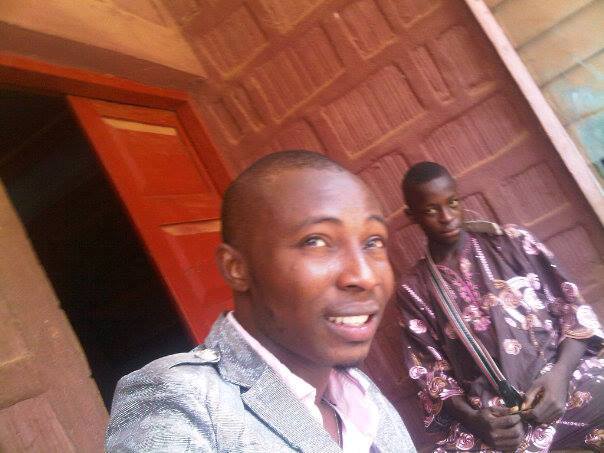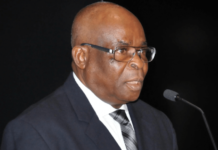 |
| Olawoyin Oladeinde Olamide |
so, as expected, he was not within that mad house that brought him fame
and reverence, the newsroom. Neither was he around the four walls of the
other room he made his place of abode at the twilight of his journalism
career: the classroom. But he was in a room ––the hospital room. At a
point, he took a breath, a very deep breath; but afterwards, he couldn’t
take any other one. That long, deep breath was his last. And it
happened that on Sunday September 20, 2009, exactly seven years ago
today, the editor died.

Between the heydays of Alhaji
Babatunde Jose, that irrepressible editor of Daily Times, through the
advent of tabloid journalism as ‘birthed’ by the ‘siamese twins’ of Mike
Awoyinfa and Dimgba Igwe, and today, many journalist-writers have
traversed the Nigerian journalism space like colossi, all of them
leaving footprints and everlasting legacies for others coming behind.
There was the cerebral Alhaji Alade “Allah De” Odunewu, the three
musketeers of Nigerian Journalism, Felix Adenaike, Peter Ajayi and Aremo
Segun Oshoba, as well as Peter ‘Peter Pan’ Enahoro. There was
Professor Olatunji Dare, that inimitable satirist; Northern Nigeria’s
most decorated syndicated columnist, Mallam Mohammed Haruna; Alhaji Liad
Tella; the late Hajiya Bilikisu Yussuf et al.
But at the
centre of these epochal periods that transcend generations, there was a
remarkable figure: Nurain Doyin Mahmoud, pioneer editor-in-chief, Daily
Independent newspaper and pioneer Head, Department of Mass
Communication, University of Ilorin.
Before his death, “Egbon
Doyin”, as he was fondly called by reporters he worked with at the
Guardian, was, Vice President, Commonwealth Journalists Association
(CJA), as well as member, National Thinktank. He facilitated the entry
of more than a dozen other reputable reporters into journalism. He also,
in addition, consistently followed their steady progress in the
journalism profession.
In a way, for Doyin, journalism was more than a profession; it was a religion, the tenets of which he held sacrosanct.
(adsbygoogle = window.adsbygoogle || []).push({});
It is against this background that we can properly situate his somewhat
controversial resignation of appointment as Editor-in-Chief, Daily
Independent newspaper, a paper he helped found from the scratch, in
2001. He was reported to have refused to muddle up professionalism with
politics, culminating in his decision to facilitate the establishment of
the Department of Mass Communication, University of Ilorin, later in
2002. Teaching was dear to Doyin Mahmoud, and it is no surprise that he
worked, for years, as Training Editor, The Guardian newspaper, a
position he merited by a dint of hard-work and resilience, before coming
into the academics.
In the 1990’s, six thoroughbred
journalists teamed up to start a project: there was Dapo in Herald, Femi
Ojudu and Bayo Onanuga from African Concord, Chris Mammah of Punch, and
of course Richard Akinnola and Owei Lakemfa from Vanguard newspapers.
But it is a tribute to Doyin Mahmoud’s vaunted integrity that when they
needed a national figure to join them for the purpose of wider
acceptability, he was picked. Doyin Mahmoud, according to them, had all
the qualities they were looking for and the fact that he was not a
hustling editor but a principled one who would neither be intimidated
nor bought over, made him the most suitable for the job. Although the
publication business was not successful, Femi, Bayo and Idowu however
continued the dream by establishing one of Nigeria’s most authoritative
publication on the news stand, The News magazine, and the now rested AM
and PM newspapers.
Doyin Mahmoud was an avid reader of books
and literature texts, a culture which, he said, helped him in becoming a
great writer. Of course, the same culture also fetched him the
sobriquet “Booker T” while at the Guardian sub-desk. It was no surprise
that he ended up, before his death, in the classroom.
Dear ‘Booker T’, yours was a life well spent. The essence of our
existence, the purpose of our collective being around this space, is to
make the most impact while we are here. And if wishes were witches, it
would be most suitable to see you come back to this realm and examine
the growth of your legacy, the Department of Mass Communication,
UNILORIN. Because, here, you’d be glad that veterans and respected
academics have, over the years, kept the flag flying. They have
continued to nurture your dreams –the training of well-groomed
journalists and communication professionals.
Here, the roll
call: Dr. Saudat Abdul-baaqi, our Head of department whose perfect blend
of motherly love, affection and firm discipline still remains a source
of mystery to me; Dr. Azeez Adesina, the don whose commitment to
academic excellence and high standards is a source of awe and admiration
and, of course, Professor Oyeyinka Oyewo whose brief stint at the
department remains one of our most cherished experiences with a
lecturer. There are the duo of famed veterans like Barrister Mahmoud
Abdulraheem and Alhaji Liad Tella, both of them encyclopedias of
broadcasting and journalism practices, respectively. There, also, is Dr.
Lambe Kayode Mustapha, that amazingly brilliant, resourceful,
articulate and energetic promoter of the avant-garde; and Dr. Kehinde
Kadiri, an epitome of beauty and brain!
Yes, there is Dr.
Laaro Abdulqadri; the fatherly Dr. Y. Abubakar; as well as the cerebral
Dr Rasaq Adisa who has been a dependable pillar of journalism in the
department. There is the urbane Dr. Patrick Udende and the admirably
calm, brilliant and articulate duo of Mrs A. Salau and Mrs. Aishat
Omolosho. There, also, is the brilliant Mrs. Maryam Mustapha; the
energetic and youthful Mr. Abdulgafar Arikewuyo and the equally calm and
reserved Miss Rukayat Adegoke. Worthy of note, too, is Mr. T. Yussuf.
“Booker T” is gone. He isn’t here anymore. But he is still here. His
works, his legacies, are still here. And those he impacted in the
journalism profession, as well as those who drank from his sea of
knowledge in the classroom, will continue to remember him. And that,
ultimately, is the hallmark of a life well spent.
Life is
interesting. Life is good. Life is beautiful. But death is the dreadful
reminder of that spine-chilling truism: life is short.
Sleep well, Nurain Doyin Mahmoud.
Olamide is a communication expert based based in Lagos.










